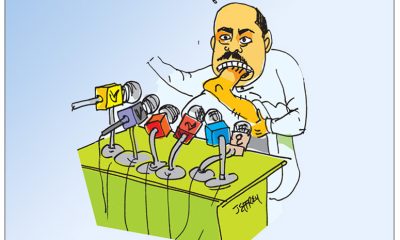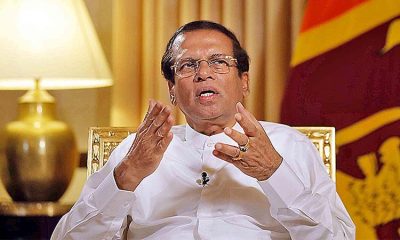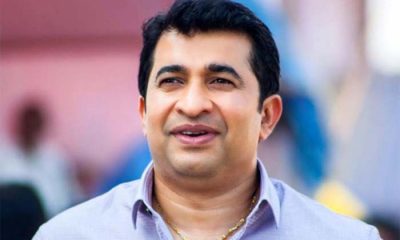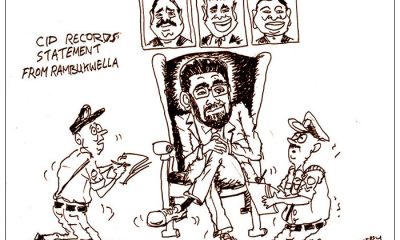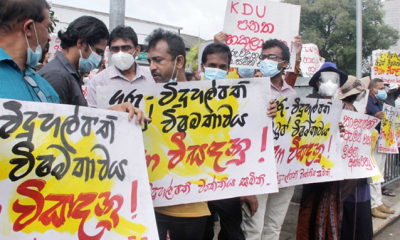Features
Paddy harvest vs electricity; storm over style of singing

Cassandra in her Friday Cry-s has often noted with deep gratitude  that nature has been benevolent to suffering, down and almost out Sri Lanka. Forest fires due to intemperate temperature in usually cool climes; sudden floods due to torrential rains; erupting volcanoes and earthquakes have all assiduously avoided troubling poor little Sri Lanka struggling against economic woes and continuing corruption. Sadly, not so any longer; meaning climate-changed Nature has struck us, though not cataclysmically nor totally catastrophically, but struck she has. A water shortage from wewas that feed the major rice producing areas of Hambanatota, Uda Walawe, Ampara and elsewhere is prevalent.
that nature has been benevolent to suffering, down and almost out Sri Lanka. Forest fires due to intemperate temperature in usually cool climes; sudden floods due to torrential rains; erupting volcanoes and earthquakes have all assiduously avoided troubling poor little Sri Lanka struggling against economic woes and continuing corruption. Sadly, not so any longer; meaning climate-changed Nature has struck us, though not cataclysmically nor totally catastrophically, but struck she has. A water shortage from wewas that feed the major rice producing areas of Hambanatota, Uda Walawe, Ampara and elsewhere is prevalent.
Farmers are desperate because needed water for their growing paddy fields has not been trickling in, leave alone spurting forth along irrigation channels. Water was not released from sources such as Uda Walawe and Samanala Wewa. And why? Levels have fallen so low. It was shocking to see pictures of the Uda Walawe Wewa which Cass remembers to have been so full and sea-like when the area was a favourite family holiday spot some years back. The deep water lapped the bund on which vehicles travelled. This week’s TV photographs showed water that was sure shallow far away in the middle of a vast acreage of bare tank bed. Samanala Wewa water is used to generate electricity.
Farmers are on strike – sit down, silent ones. They have loudly proclaimed their prediction that this season their paddy harvest will fail. They shed heart felt tears over their fear of not being able to feed their families and death from starvation staring them in the face. We echo their cries since no harvest means shortage of rice and importing of inferior varieties at great cost – unaffordable as of now.
Two contrary ministers
Two ministers are pitting themselves against each other, trumpeted by various trade unions and political pandits. The Minister of Power powerfully puts forth the threat of four hour power cuts if water is released from the Samanala Wewa to paddy fields. The Minister of Agriculture smilingly, meekly proclaims he will get water released for paddy farmers. The threatened power cuts will be only for southern areas. So where’s the balance between the two fears/threats? The weighing scale, not only to Cassandra but all right thinking people, tips strong in favour of water to paddy farmers. We, or they, the Southrners can suffer power cuts for short periods, but stomachs have to be filled, at least to some extent. TV news yesterday had a spokesman from a mushroomed people’s forum declare that power supply depletion info is merely to buy electricity from money-making private sources. Power mafia at work?
The onsetting SW Monsoon seems not to have brought sufficient rain to fill our wewas, which surprisingly are either overflowing at great danger to those living below spill gates or so low the water can hardly be seen. Where have the always full wewas gone to? Or been sent to? We do hope that at least the receding monsoon will fill these thirsting wewas. Or have the poor farmers to wait for the North East Monsoon – much weaker and not widespread in its dispersal of rain, by which time the now growing paddy plants would have turned to old piduru.
The singer not the song
The song was our national anthem sung at the inauguration of LPL cricket matches, and the singer, I learned, was popular Umara Sinhawansa. Her crime – which to some ultra nationalists (stoopid to Cass) was heinous – was that she rendered Namo Matha in a novel style – operatic it was said. SO WHAT!?
The moment Cass heard that a singer was faulted at the LPL tournament, she remembered how a Sri Lankan opera singer of international fame was booed and derided after the newly formed Yahapalanaya government’s February 4 National Day ceremony in Galle Face Green. This talented, beautiful singer decided to give Danno Bundunge an enhanced lilt with a slightly different rendition from the usual. Didn’t she get into hot water for that! Similarly, as stupidly and insanely as then, Umara is being said by a few ‘legal bigwigs’ to have violated the Constitution of the Democratic, Socialist Republic of SL! Bah to that!
Please read the editorial in The Island of Wednesday August 2, under the title Singer under fire, where the Editor, in his usual sharp and succinct manner verbally shoots around. To show the absolute triviality of the matter in hand – the manner of singing the national anthem – he mentions crimes committed in presidential pardons given to the worst type of criminal with hardly a public protest. Against those ‘mistakes’ of the highest in the land – Mahinda R, Maithripala S, Gotabaya R and Ranil W – Presidents granting pardons of those in death row, this singer’s mistake is as a mustard seed is to an elephant. She is being crucified because some people know no singing style other than the rough and ready baila. This is Sri Lanka for you! Nitty gritties gather so much publicity and social media hype while huge economic crimes, corruption, rape and murder by politicians pass uncensored or ignored.
Referring back to Presidential pardons, the most unpardonable and horrific is Prez Ranil W pardoning them who blew up the Central Bank killing hundreds, blinding and injuring many and causing such economic loss to the country. No protest except a couple of newspaper editorials, a voice or two in the wilderness and a smattering of letters to the Editor like Pardon for terrorists unpardonable by Ranjith Soysa, spokesperson for SPUR in many states of Australia and another Lankan organisation in London.
To Cassandra’s manner of thinking and reaching summations, this privilege given to Presidents of this land amounts to contempt of court since the pardons are for persons judged criminal by the highest court of law. Ranjan Ramanayake was sentenced to four years hard labour just because he gave leeway to his big mouth. Similar for Congress Leader and scion of India’s most respected family – Rahul Gandhi. He said, maybe laughingly, that in any pack of thieves (was it?) there was sure to be a Modi. What weight does that carry for goodness sake! Didn’t Gandhi have to resign his MPship for this statement considered libelous and/or contempt of court. Please correct Cass if she is wrong; don’t quarter and slaughter her. The privilege of pardon MUST be removed from those allowed our presidents; better still remove forever the presidency.
Splashes of humour
Cassandra often rolls around laughing at pronouncements made by politicians. It must however be qualified that her laugh is not a happy one. It is spontaneous, but prompted by derision. Recently, she guffawed at the command issued by the Leader of the Opposition to the Prez himself. In his inimitable style of speaking, whether in King Charles III’s language or our very own national language of Sinhala, he pontificated: “the satyagraha by Embilipitiya farmers has started demanding water for the crops that are blossoming and however, the authorities of this relentless government seem to have no empathy at all …”
It must be the translator’s fault for causing extra derisive laughter by translating his statement ludicrously. Does paddy blossom forth? Sajith would have pronounced the demand in studied Sinhala so more would appreciate his concern. Jeff and Mutt pounced on Sajith’s declared command, asking: “Does he expect the President to cause rains?”
Vegetables being imported
Writing about paddy which gives us our staple food, Cass had its accompaniment vegetables coming to mind immediately followed by Tuesday’s TV announcement that vegetable growers in Welimada, while harvesting their potato crops, complained bitterly the government was considering (or already) importing vegetables. Potatoes are imported cutting into the up county potato production. Importing eggs is bad enough. We should never import vegetables. Make people grow whatever vegetable wherever possible. We can be self-sufficient in this food commodity at least.
a
Features
The heart-friendly health minister

by Dr Gotabhya Ranasinghe
Senior Consultant Cardiologist
National Hospital Sri Lanka
When we sought a meeting with Hon Dr. Ramesh Pathirana, Minister of Health, he graciously cleared his busy schedule to accommodate us. Renowned for his attentive listening and deep understanding, Minister Pathirana is dedicated to advancing the health sector. His openness and transparency exemplify the qualities of an exemplary politician and minister.
Dr. Palitha Mahipala, the current Health Secretary, demonstrates both commendable enthusiasm and unwavering support. This combination of attributes makes him a highly compatible colleague for the esteemed Minister of Health.
Our discussion centered on a project that has been in the works for the past 30 years, one that no other minister had managed to advance.
Minister Pathirana, however, recognized the project’s significance and its potential to revolutionize care for heart patients.
The project involves the construction of a state-of-the-art facility at the premises of the National Hospital Colombo. The project’s location within the premises of the National Hospital underscores its importance and relevance to the healthcare infrastructure of the nation.
This facility will include a cardiology building and a tertiary care center, equipped with the latest technology to handle and treat all types of heart-related conditions and surgeries.
Securing funding was a major milestone for this initiative. Minister Pathirana successfully obtained approval for a $40 billion loan from the Asian Development Bank. With the funding in place, the foundation stone is scheduled to be laid in September this year, and construction will begin in January 2025.
This project guarantees a consistent and uninterrupted supply of stents and related medications for heart patients. As a result, patients will have timely access to essential medical supplies during their treatment and recovery. By securing these critical resources, the project aims to enhance patient outcomes, minimize treatment delays, and maintain the highest standards of cardiac care.
Upon its fruition, this monumental building will serve as a beacon of hope and healing, symbolizing the unwavering dedication to improving patient outcomes and fostering a healthier society.We anticipate a future marked by significant progress and positive outcomes in Sri Lanka’s cardiovascular treatment landscape within the foreseeable timeframe.
Features
A LOVING TRIBUTE TO JESUIT FR. ALOYSIUS PIERIS ON HIS 90th BIRTHDAY

by Fr. Emmanuel Fernando, OMI
Jesuit Fr. Aloysius Pieris (affectionately called Fr. Aloy) celebrated his 90th birthday on April 9, 2024 and I, as the editor of our Oblate Journal, THE MISSIONARY OBLATE had gone to press by that time. Immediately I decided to publish an article, appreciating the untiring selfless services he continues to offer for inter-Faith dialogue, the renewal of the Catholic Church, his concern for the poor and the suffering Sri Lankan masses and to me, the present writer.
It was in 1988, when I was appointed Director of the Oblate Scholastics at Ampitiya by the then Oblate Provincial Fr. Anselm Silva, that I came to know Fr. Aloy more closely. Knowing well his expertise in matters spiritual, theological, Indological and pastoral, and with the collaborative spirit of my companion-formators, our Oblate Scholastics were sent to Tulana, the Research and Encounter Centre, Kelaniya, of which he is the Founder-Director, for ‘exposure-programmes’ on matters spiritual, biblical, theological and pastoral. Some of these dimensions according to my view and that of my companion-formators, were not available at the National Seminary, Ampitiya.
Ever since that time, our Oblate formators/ accompaniers at the Oblate Scholasticate, Ampitiya , have continued to send our Oblate Scholastics to Tulana Centre for deepening their insights and convictions regarding matters needed to serve the people in today’s context. Fr. Aloy also had tried very enthusiastically with the Oblate team headed by Frs. Oswald Firth and Clement Waidyasekara to begin a Theologate, directed by the Religious Congregations in Sri Lanka, for the contextual formation/ accompaniment of their members. It should very well be a desired goal of the Leaders / Provincials of the Religious Congregations.
Besides being a formator/accompanier at the Oblate Scholasticate, I was entrusted also with the task of editing and publishing our Oblate journal, ‘The Missionary Oblate’. To maintain the quality of the journal I continue to depend on Fr. Aloy for his thought-provoking and stimulating articles on Biblical Spirituality, Biblical Theology and Ecclesiology. I am very grateful to him for his generous assistance. Of late, his writings on renewal of the Church, initiated by Pope St. John XX111 and continued by Pope Francis through the Synodal path, published in our Oblate journal, enable our readers to focus their attention also on the needed renewal in the Catholic Church in Sri Lanka. Fr. Aloy appreciated very much the Synodal path adopted by the Jesuit Pope Francis for the renewal of the Church, rooted very much on prayerful discernment. In my Religious and presbyteral life, Fr.Aloy continues to be my spiritual animator / guide and ongoing formator / acccompanier.
Fr. Aloysius Pieris, BA Hons (Lond), LPh (SHC, India), STL (PFT, Naples), PhD (SLU/VC), ThD (Tilburg), D.Ltt (KU), has been one of the eminent Asian theologians well recognized internationally and one who has lectured and held visiting chairs in many universities both in the West and in the East. Many members of Religious Congregations from Asian countries have benefited from his lectures and guidance in the East Asian Pastoral Institute (EAPI) in Manila, Philippines. He had been a Theologian consulted by the Federation of Asian Bishops’ Conferences for many years. During his professorship at the Gregorian University in Rome, he was called to be a member of a special group of advisers on other religions consulted by Pope Paul VI.
Fr. Aloy is the author of more than 30 books and well over 500 Research Papers. Some of his books and articles have been translated and published in several countries. Among those books, one can find the following: 1) The Genesis of an Asian Theology of Liberation (An Autobiographical Excursus on the Art of Theologising in Asia, 2) An Asian Theology of Liberation, 3) Providential Timeliness of Vatican 11 (a long-overdue halt to a scandalous millennium, 4) Give Vatican 11 a chance, 5) Leadership in the Church, 6) Relishing our faith in working for justice (Themes for study and discussion), 7) A Message meant mainly, not exclusively for Jesuits (Background information necessary for helping Francis renew the Church), 8) Lent in Lanka (Reflections and Resolutions, 9) Love meets wisdom (A Christian Experience of Buddhism, 10) Fire and Water 11) God’s Reign for God’s poor, 12) Our Unhiddden Agenda (How we Jesuits work, pray and form our men). He is also the Editor of two journals, Vagdevi, Journal of Religious Reflection and Dialogue, New Series.
Fr. Aloy has a BA in Pali and Sanskrit from the University of London and a Ph.D in Buddhist Philosophy from the University of Sri Lankan, Vidyodaya Campus. On Nov. 23, 2019, he was awarded the prestigious honorary Doctorate of Literature (D.Litt) by the Chancellor of the University of Kelaniya, the Most Venerable Welamitiyawe Dharmakirthi Sri Kusala Dhamma Thera.
Fr. Aloy continues to be a promoter of Gospel values and virtues. Justice as a constitutive dimension of love and social concern for the downtrodden masses are very much noted in his life and work. He had very much appreciated the commitment of the late Fr. Joseph (Joe) Fernando, the National Director of the Social and Economic Centre (SEDEC) for the poor.
In Sri Lanka, a few religious Congregations – the Good Shepherd Sisters, the Christian Brothers, the Marist Brothers and the Oblates – have invited him to animate their members especially during their Provincial Congresses, Chapters and International Conferences. The mainline Christian Churches also have sought his advice and followed his seminars. I, for one, regret very much, that the Sri Lankan authorities of the Catholic Church –today’s Hierarchy—- have not sought Fr.
Aloy’s expertise for the renewal of the Catholic Church in Sri Lanka and thus have not benefited from the immense store of wisdom and insight that he can offer to our local Church while the Sri Lankan bishops who governed the Catholic church in the immediate aftermath of the Second Vatican Council (Edmund Fernando OMI, Anthony de Saram, Leo Nanayakkara OSB, Frank Marcus Fernando, Paul Perera,) visited him and consulted him on many matters. Among the Tamil Bishops, Bishop Rayappu Joseph was keeping close contact with him and Bishop J. Deogupillai hosted him and his team visiting him after the horrible Black July massacre of Tamils.
Features
A fairy tale, success or debacle

Sri Lanka-Singapore Free Trade Agreement
By Gomi Senadhira
senadhiragomi@gmail.com
“You might tell fairy tales, but the progress of a country cannot be achieved through such narratives. A country cannot be developed by making false promises. The country moved backward because of the electoral promises made by political parties throughout time. We have witnessed that the ultimate result of this is the country becoming bankrupt. Unfortunately, many segments of the population have not come to realize this yet.” – President Ranil Wickremesinghe, 2024 Budget speech
Any Sri Lankan would agree with the above words of President Wickremesinghe on the false promises our politicians and officials make and the fairy tales they narrate which bankrupted this country. So, to understand this, let’s look at one such fairy tale with lots of false promises; Ranil Wickremesinghe’s greatest achievement in the area of international trade and investment promotion during the Yahapalana period, Sri Lanka-Singapore Free Trade Agreement (SLSFTA).
It is appropriate and timely to do it now as Finance Minister Wickremesinghe has just presented to parliament a bill on the National Policy on Economic Transformation which includes the establishment of an Office for International Trade and the Sri Lanka Institute of Economics and International Trade.
Was SLSFTA a “Cleverly negotiated Free Trade Agreement” as stated by the (former) Minister of Development Strategies and International Trade Malik Samarawickrama during the Parliamentary Debate on the SLSFTA in July 2018, or a colossal blunder covered up with lies, false promises, and fairy tales? After SLSFTA was signed there were a number of fairy tales published on this agreement by the Ministry of Development Strategies and International, Institute of Policy Studies, and others.
However, for this article, I would like to limit my comments to the speech by Minister Samarawickrama during the Parliamentary Debate, and the two most important areas in the agreement which were covered up with lies, fairy tales, and false promises, namely: revenue loss for Sri Lanka and Investment from Singapore. On the other important area, “Waste products dumping” I do not want to comment here as I have written extensively on the issue.
1. The revenue loss
During the Parliamentary Debate in July 2018, Minister Samarawickrama stated “…. let me reiterate that this FTA with Singapore has been very cleverly negotiated by us…. The liberalisation programme under this FTA has been carefully designed to have the least impact on domestic industry and revenue collection. We have included all revenue sensitive items in the negative list of items which will not be subject to removal of tariff. Therefore, 97.8% revenue from Customs duty is protected. Our tariff liberalisation will take place over a period of 12-15 years! In fact, the revenue earned through tariffs on goods imported from Singapore last year was Rs. 35 billion.
The revenue loss for over the next 15 years due to the FTA is only Rs. 733 million– which when annualised, on average, is just Rs. 51 million. That is just 0.14% per year! So anyone who claims the Singapore FTA causes revenue loss to the Government cannot do basic arithmetic! Mr. Speaker, in conclusion, I call on my fellow members of this House – don’t mislead the public with baseless criticism that is not grounded in facts. Don’t look at petty politics and use these issues for your own political survival.”
I was surprised to read the minister’s speech because an article published in January 2018 in “The Straits Times“, based on information released by the Singaporean Negotiators stated, “…. With the FTA, tariff savings for Singapore exports are estimated to hit $10 million annually“.
As the annual tariff savings (that is the revenue loss for Sri Lanka) calculated by the Singaporean Negotiators, Singaporean $ 10 million (Sri Lankan rupees 1,200 million in 2018) was way above the rupees’ 733 million revenue loss for 15 years estimated by the Sri Lankan negotiators, it was clear to any observer that one of the parties to the agreement had not done the basic arithmetic!
Six years later, according to a report published by “The Morning” newspaper, speaking at the Committee on Public Finance (COPF) on 7th May 2024, Mr Samarawickrama’s chief trade negotiator K.J. Weerasinghehad had admitted “…. that forecasted revenue loss for the Government of Sri Lanka through the Singapore FTA is Rs. 450 million in 2023 and Rs. 1.3 billion in 2024.”
If these numbers are correct, as tariff liberalisation under the SLSFTA has just started, we will pass Rs 2 billion very soon. Then, the question is how Sri Lanka’s trade negotiators made such a colossal blunder. Didn’t they do their basic arithmetic? If they didn’t know how to do basic arithmetic they should have at least done their basic readings. For example, the headline of the article published in The Straits Times in January 2018 was “Singapore, Sri Lanka sign FTA, annual savings of $10m expected”.
Anyway, as Sri Lanka’s chief negotiator reiterated at the COPF meeting that “…. since 99% of the tariffs in Singapore have zero rates of duty, Sri Lanka has agreed on 80% tariff liberalisation over a period of 15 years while expecting Singapore investments to address the imbalance in trade,” let’s turn towards investment.
Investment from Singapore
In July 2018, speaking during the Parliamentary Debate on the FTA this is what Minister Malik Samarawickrama stated on investment from Singapore, “Already, thanks to this FTA, in just the past two-and-a-half months since the agreement came into effect we have received a proposal from Singapore for investment amounting to $ 14.8 billion in an oil refinery for export of petroleum products. In addition, we have proposals for a steel manufacturing plant for exports ($ 1 billion investment), flour milling plant ($ 50 million), sugar refinery ($ 200 million). This adds up to more than $ 16.05 billion in the pipeline on these projects alone.
And all of these projects will create thousands of more jobs for our people. In principle approval has already been granted by the BOI and the investors are awaiting the release of land the environmental approvals to commence the project.
I request the Opposition and those with vested interests to change their narrow-minded thinking and join us to develop our country. We must always look at what is best for the whole community, not just the few who may oppose. We owe it to our people to courageously take decisions that will change their lives for the better.”
According to the media report I quoted earlier, speaking at the Committee on Public Finance (COPF) Chief Negotiator Weerasinghe has admitted that Sri Lanka was not happy with overall Singapore investments that have come in the past few years in return for the trade liberalisation under the Singapore-Sri Lanka Free Trade Agreement. He has added that between 2021 and 2023 the total investment from Singapore had been around $162 million!
What happened to those projects worth $16 billion negotiated, thanks to the SLSFTA, in just the two-and-a-half months after the agreement came into effect and approved by the BOI? I do not know about the steel manufacturing plant for exports ($ 1 billion investment), flour milling plant ($ 50 million) and sugar refinery ($ 200 million).
However, story of the multibillion-dollar investment in the Petroleum Refinery unfolded in a manner that would qualify it as the best fairy tale with false promises presented by our politicians and the officials, prior to 2019 elections.
Though many Sri Lankans got to know, through the media which repeatedly highlighted a plethora of issues surrounding the project and the questionable credentials of the Singaporean investor, the construction work on the Mirrijiwela Oil Refinery along with the cement factory began on the24th of March 2019 with a bang and Minister Ranil Wickremesinghe and his ministers along with the foreign and local dignitaries laid the foundation stones.
That was few months before the 2019 Presidential elections. Inaugurating the construction work Prime Minister Ranil Wickremesinghe said the projects will create thousands of job opportunities in the area and surrounding districts.
The oil refinery, which was to be built over 200 acres of land, with the capacity to refine 200,000 barrels of crude oil per day, was to generate US$7 billion of exports and create 1,500 direct and 3,000 indirect jobs. The construction of the refinery was to be completed in 44 months. Four years later, in August 2023 the Cabinet of Ministers approved the proposal presented by President Ranil Wickremesinghe to cancel the agreement with the investors of the refinery as the project has not been implemented! Can they explain to the country how much money was wasted to produce that fairy tale?
It is obvious that the President, ministers, and officials had made huge blunders and had deliberately misled the public and the parliament on the revenue loss and potential investment from SLSFTA with fairy tales and false promises.
As the president himself said, a country cannot be developed by making false promises or with fairy tales and these false promises and fairy tales had bankrupted the country. “Unfortunately, many segments of the population have not come to realize this yet”.
(The writer, a specialist and an activist on trade and development issues . )


